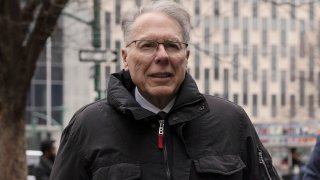
Longtime National Rifle Association chief Wayne LaPierre took the stand in his New York civil trial Friday, defending himself against allegations that he violated the trust of the group’s 5 million members by spending tens of millions of dollars to enrich himself and close associates.
Under questioning from lawyers for New York Attorney General Letitia James, LaPierre said he didn’t consider luxury vacations to be “gifts” when he accepted them from a couple who did millions of dollars of business over the years in contracts with the NRA.
James brought the lawsuit under her authority to investigate nonprofits registered in New York. Days before the trial began, LaPierre, 74, announced he would step down Jan. 31.
In the Manhattan courtroom, LaPierre acknowledged taking vacations with Hollywood producer David McKenzie, whose company has done business with the NRA. He said he met McKenzie in a business context but considers him a friend.
The state's lawyers laid out for the jury a series of trips that the two men's families took together, which McKenzie paid for and LaPierre didn't disclose in financial forms.
“At the time you didn’t consider a trip to the Greek Isles to be a gift, right?” Assistant Attorney General Jonathan Conley asked LaPierre, in one of many exchanges over the undisclosed vacation travel, lodging and food.
U.S. & World
“No, I did not,” LaPierre said.
Conley showed jurors photos of multistoried white yachts LaPierre vacationed on with McKenzie in the Bahamas and the Mediterranean, as well as photos from a trip to India. LaPierre acknowledged that McKenzie paid for commercial flights, hotels and food for many of the trips.
Get a weekly recap of the latest San Francisco Bay Area housing news. Sign up for NBC Bay Area’s Housing Deconstructed newsletter.
At the time he was making those trips, LaPierre helped McKenzie's media company secure a 9-year contract with the NRA worth millions, he acknowledged. Conley also noted that McKenzie personally collected $1.8 million alone in property rental fees for filming NRA content in a home he owns in Los Angeles.
Under LaPierre's leadership, the NRA became a powerful political lobby group, in addition to its role as a firearms training organization. In recent years it has faced financial troubles, dwindling membership and a leadership crisis.
After reporting a $36 million deficit in 2018, the NRA cut back on core programs like training and education, recreational shooting and law enforcement initiatives. Experts have said LaPierre was behind much of the misspending that led to the fiscal downturn, including on employee perks and an unprofitable television venture.
The New York attorney general sued LaPierre and three co-defendants in 2020, alleging they cost the organization tens of millions of dollars by authorizing lucrative consulting contracts for ex-employees and expensing gifts for friends and vendors.
The state is asking the judge to limit the work they can do for the NRA and New York-based nonprofits, and also to make them repay the NRA and even forfeit any salaries earned while misallocating funds.
LaPierre is accused of dodging financial disclosure forms while spending NRA money on travel consultants, luxury car services, and private flights for himself and his family. He has acknowledged spending over $500,000 of the NRA's money on private airfare for family trips to the Bahamas, but says flying commercial would have put him in danger.



